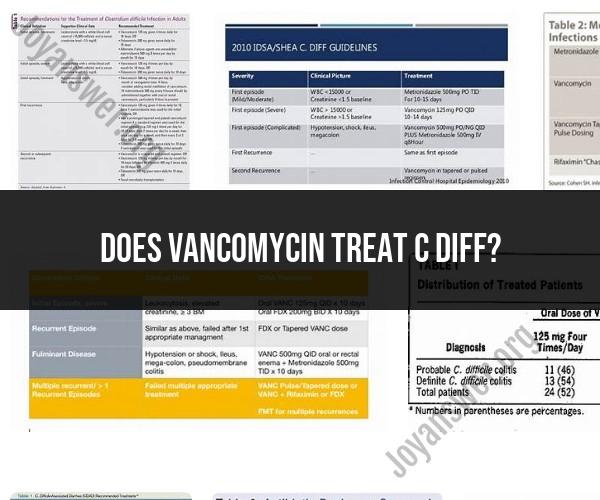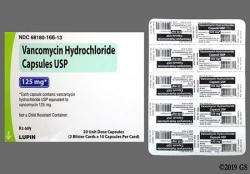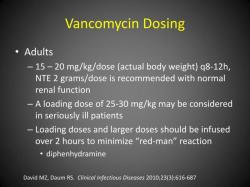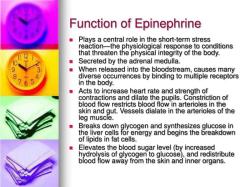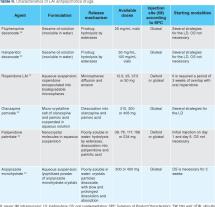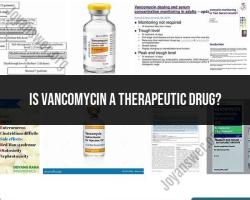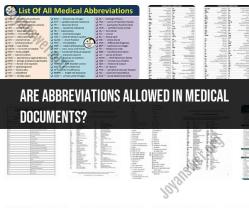Does vancomycin treat C diff?
Yes, vancomycin is one of the antibiotics used to treat infections caused by Clostridium difficile, often referred to as "C. diff" or "C. difficile."
C. difficile is a bacterium that can cause colitis and severe diarrhea, particularly in individuals who have taken broad-spectrum antibiotics that disrupt the balance of beneficial gut bacteria. When C. difficile infection (CDI) becomes severe, it is important to use antibiotics that specifically target C. difficile.
Vancomycin is one of the primary antibiotics used to treat C. difficile infections. It is effective because it can reach the colon, where C. difficile infection often occurs, and it is not readily absorbed into the bloodstream, allowing it to act locally in the gut. Vancomycin works by inhibiting the growth of C. difficile bacteria and reducing the symptoms of the infection.
However, it's important to note that vancomycin is typically reserved for more severe cases of C. difficile infection. Milder cases may be treated with other antibiotics like metronidazole. The choice of antibiotic and the duration of treatment will be determined by a healthcare professional based on the severity of the infection and individual patient factors.
Additionally, treatment for C. difficile infection may involve discontinuing the use of the antibiotic that triggered the infection (if applicable) and maintaining good hygiene and infection control practices to prevent its spread.
It's crucial for individuals with suspected C. difficile infections to seek medical attention promptly, as untreated or inadequately treated C. difficile infections can lead to complications and severe illness. The use of antibiotics like vancomycin is an important part of the treatment regimen for C. difficile infections, but it should be administered under the guidance of a healthcare provider to ensure appropriate diagnosis and management.
Vancomycin's Role in Treating Clostridium difficile Infections
Vancomycin is a glycopeptide antibiotic that is commonly used to treat Clostridium difficile (C. diff) infections. C. diff is a bacterium that can cause diarrhea, colitis, and other serious health problems.
Vancomycin is effective against C. diff because it inhibits the growth and replication of the bacterium. It does this by binding to the cell wall of the bacterium and preventing it from forming.
Efficacy and Mechanism of Action Against C. diff
Vancomycin is a very effective treatment for C. diff infections. It has a cure rate of over 90%.
Vancomycin works by inhibiting the growth and replication of the C. difficile bacterium. It does this by binding to the cell wall of the bacterium and preventing it from forming. This prevents the bacterium from multiplying and causing further damage to the intestines.
Proper Administration and Dosage of Vancomycin for C. diff
Vancomycin is typically administered orally for C. diff infections. The dosage of vancomycin depends on the severity of the infection and the age and weight of the patient.
For adults, the usual dosage of vancomycin for C. diff is 125 mg four times a day for 10 to 14 days. For severe infections, the dosage may be increased to 250 mg four times a day.
For children, the dosage of vancomycin is calculated based on their weight. The usual dosage is 10 mg/kg per day divided into four doses.
Vancomycin should be taken with food to help reduce stomach upset.
Combining Vancomycin with Other Therapies for C. diff
Vancomycin may be combined with other therapies for C. diff infections, such as probiotics. Probiotics are live bacteria that are beneficial to the gut. They can help to restore the balance of bacteria in the gut and prevent C. diff infections from recurring.
Monitoring and Managing C. diff Infections
Patients with C. diff infections should be monitored closely for signs and symptoms of improvement. If the patient does not improve after 48 hours of treatment with vancomycin, the doctor may consider switching to a different antibiotic.
Patients with C. diff infections should also be monitored for signs of recurrence. Recurrence is common, especially in patients who are elderly or have underlying medical conditions.
If a patient experiences a recurrence of C. diff infection, the doctor may recommend a longer course of vancomycin or a different antibiotic.
Important note: Vancomycin is a powerful antibiotic, and it should only be used under the supervision of a doctor.
